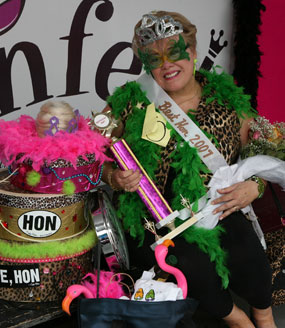The documentary “People Like Us: Social Class in America” (an excellent film, if you haven’t seen it; my students always get a kick out of it) includes a section about Honfest, a yearly festival in Baltimore. The film brings up some interesting questions about Honfest, particularly what it means that one group of Baltimore residents dresses up and acts like a caricature of another part of the population–“hons,” or working-class women (so named for their supposed habit of calling everyone “Hon”).
From the Honfest website:
The Bawlmer term of endearment, Hon, short for Honey, embodies the warmth and affection bestowed upon our neighbors and visitors alike by historic working-women of Baltimore. HonFest is an annual celebration in honor of these women…
In answer to the question, “Is the hon a dying breed?,” Denise Whiting, creator of HonFest, exclaimed, “No! Absolutely not. Hon will live on forever in our hearts, and HonFest gives everyone an opportunity to celebrate and embrace their heritage.”
The festival includes a Miss Hon contest. Here is a photo of Miss Hon 2007:
The website’s description of hons:
…the women who vie to become Baltimore’s Best Hon are a vision of the sixties-era. They are women with beehive hairdos, bright-blue eye shadow, spandex pants and anything with leopard print!
But commentators in the documentary argue that some of the things being parodied–big hair, certain makeup and clothing styles–are still common, particularly in the working-class areas of Baltimore. From this perspective, it’s not just that people are mimicking or parodying the past; there’s also an element of class ridicule involved (since the style, taste, and speech associated with working-class women are being fetishized and parodied by other, often wealthier, women). This brings up a number of questions: Is this just good-hearted fun? Is it truly honoring these women, or mocking them? Does it bring attention to Baltimore’s working class residents, or simply treat them like they are historic relics?
(In)famous Baltimore resident and “Hairspray” director John Waters says,
It’s condescending now. The people that celebrate it are not from it. I feel that in some weird way they’re looking slightly down on it.
This might be useful for a discussion of social class and issues of representation–is Honfest respectful and fun or condescending? Does it make any difference whether some of the styles and mannerisms being parodied are still used by working-class women? Does it matter what the class background of attendees and participants tends to be? You might compare it to the controversy surrounding American Indian sports mascots for a discussion of concerns about representation more broadly.


Comments 2
Jon - The DC Travele — March 3, 2009
If people get "offended" over this innocent fest, and think it's a class ridiclue issue of people that don't exist any more except in sterotypes and on Married with Children, they probably are a bit too sensitive and should stay away.
russo — February 1, 2026
So good ultimate tic tac toe